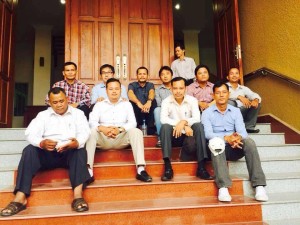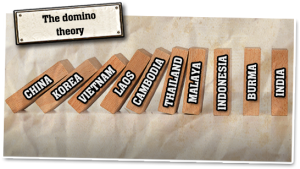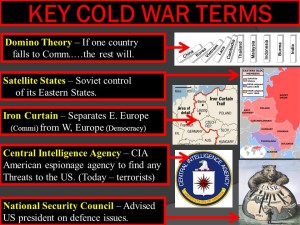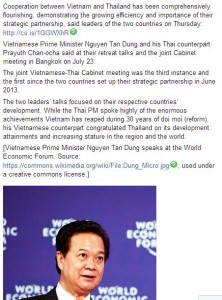Firstly, I would like to personally appeal to the Cambodian government to release the 11 detainees immediately without delay in order to shoulder for national strength to face a new challenging international geopolitics changes.

At the moment, the changes of political landscape of the world have clearly complex, the bloc has been shaped differently, and the post cold war domino effect theory is likely irrelevant.
Domino effect was accurately theorized by Western scholar to shun the communism spread pushed by China to Vietnam to Cambodia and to Thailand. But now, this domino phenomena has been changing faces and directions.
 Right now, China and Vietnam have heated up conflicts on the ownership of Spratly Island. The history of China-Vietnam conflicts has been recorded since the ancient politics but it was changed during the cold war and post-cold war. However, the patronage of China towards Vietnam in dismantling the USA base of South Vietnam, and the help of China to unify the North and South Vietnam, had turned bad effect on China when Vietnam unanimously decided to invade Cambodia in January 7, 1979. During that time, Vietnam was with Russia in the belief to change its patron by changing political ideology from Maoism to Leninism while both ideologies are just byproduct of Marxism, the extreme scholar/theorist on human equality.
Right now, China and Vietnam have heated up conflicts on the ownership of Spratly Island. The history of China-Vietnam conflicts has been recorded since the ancient politics but it was changed during the cold war and post-cold war. However, the patronage of China towards Vietnam in dismantling the USA base of South Vietnam, and the help of China to unify the North and South Vietnam, had turned bad effect on China when Vietnam unanimously decided to invade Cambodia in January 7, 1979. During that time, Vietnam was with Russia in the belief to change its patron by changing political ideology from Maoism to Leninism while both ideologies are just byproduct of Marxism, the extreme scholar/theorist on human equality.
 This July 23, 2015, Vietnam top leader Nyuen Phu Truong and Thailand’s military leader Prayuth Chan-ocha shook hand to strengthen bilateral trade and political cooperation. This happened after few days of Vietnamese top leader was greeted and shaken hand by American president Barack Obama in honor to reopen diplomatic tie between both countries as well as to diffuse more military and investment boost for Vietnam.
This July 23, 2015, Vietnam top leader Nyuen Phu Truong and Thailand’s military leader Prayuth Chan-ocha shook hand to strengthen bilateral trade and political cooperation. This happened after few days of Vietnamese top leader was greeted and shaken hand by American president Barack Obama in honor to reopen diplomatic tie between both countries as well as to diffuse more military and investment boost for Vietnam.
So where is Cambodia now?

With the government head leans towards China, Cambodia is believed to strengthen tie with China closer than any time of Cambodia historical diplomacy ties beside of the Khmer Rouge government. This tie strengthening has triggered many doubts on how Cambodia could use this opportunity efficiently, or Cambodia has no clue on its true foreign policy?
Foreign policy means extra territorial nation state relationship that can boost mutual interest at the maximum. Cambodia must be concerned on foreign policy pragmatism that all countries around the world are important friends for Cambodia. USA, China, Vietnam, or Thailand, etc.; Cambodia must ensure that we can go along with them all except a country violates Cambodia interests.
Hence, a strong country can pursue a strong foreign policy depends on the internal strength of that country. Now, Cambodian people have questioned that “how much Cambodia internal unity and nation institution are strong?”
It is hard to comprehend on this as:
- Government is not reluctant to use the court to silent the critics and threaten the opposition party CNRP by convicting the 11 political activists of the CNRP on lethal felony nation insurrection to jail termed between 7 to 20 years.
- Government without fear to pass the controversial law on NGOs and civil society (LANGO) even-though there are strong opposes by the international communities.
These recent two scenarios have placed Cambodia into a self-inflicting pot in front of the flashing heated foreign policy challenges.

